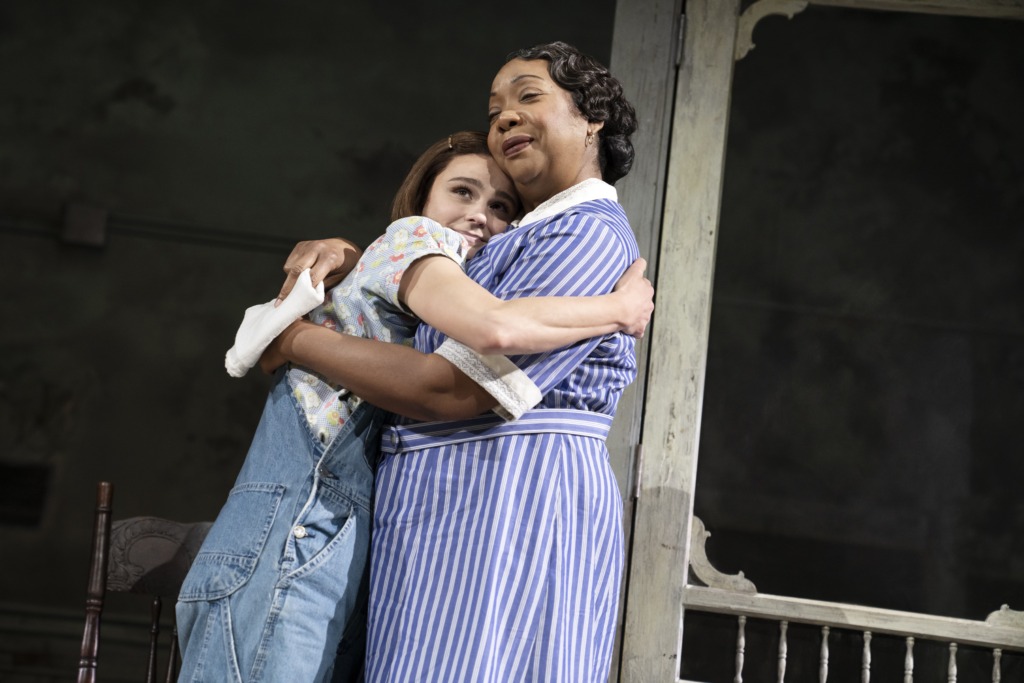Sixty years ago Harper Lee penned what has become perhaps the quintessential American coming of age novel, the enduring and beloved staple of middle school American Literature curriculums To Kill a Mockingbird, which became in turn one of the most enduring and beloved movies of all time starring Gregory Peck, winner of the Academy Award for his endearing, human portrayal of antihero Atticus Finch trying to make a difference in the morality of the deep South.
Five years ago, a new version of the play debuted on Broadway by Oscar and Emmy Award winning screenwriter (The West Wing, The Social Network, Being the Ricardos) and playwright (A Few Good Men) Aaron Sorkin, whose triumphant arrival was unfortunately overshadowed by a good degree of internal and external controversy. Originally it was criticized by purists who disagreed with Sorkin’s revisions of the beloved pieces (“This isn’t Harper Lee’s To Kill a Mockingbird,” as it was billed on the marquee, “it’s Aaron Sorkin’s To Kill a Mockingbird”, was the general consensus from its critics.) He not only focused the bulk of the plot on the Tom Robinson rape trial but he made Atticus the star of the piece, using the children (particularly the book’s lead character, daughter Scout) as the narrators stepping in and out of adult versions of themselves retelling the seminal events of their childhood and judgmentally observing the trial, then falling back into their childish personas to perform in the story they are telling. He also spent much effort developing and defining the African-American characters (the unjustly accused Robinson and the Finch’s maid Calpurnia) more fully within the story. But the bulk of the controversy came courtesy of the show’s arrogant monster producer, Broadway bully Scott Rudin, who endeared himself to no one when he pulled shenanigans such as countersuing the estate of Lee for protesting changes to the script and suing every small community and high school theatre company near any major market touring house performing another author’s previous version of the work which he had no stakes in, claiming Lee’s estate gave him exclusive rights to the piece (all unfounded, but what little group had the money to fight this behemoth?).
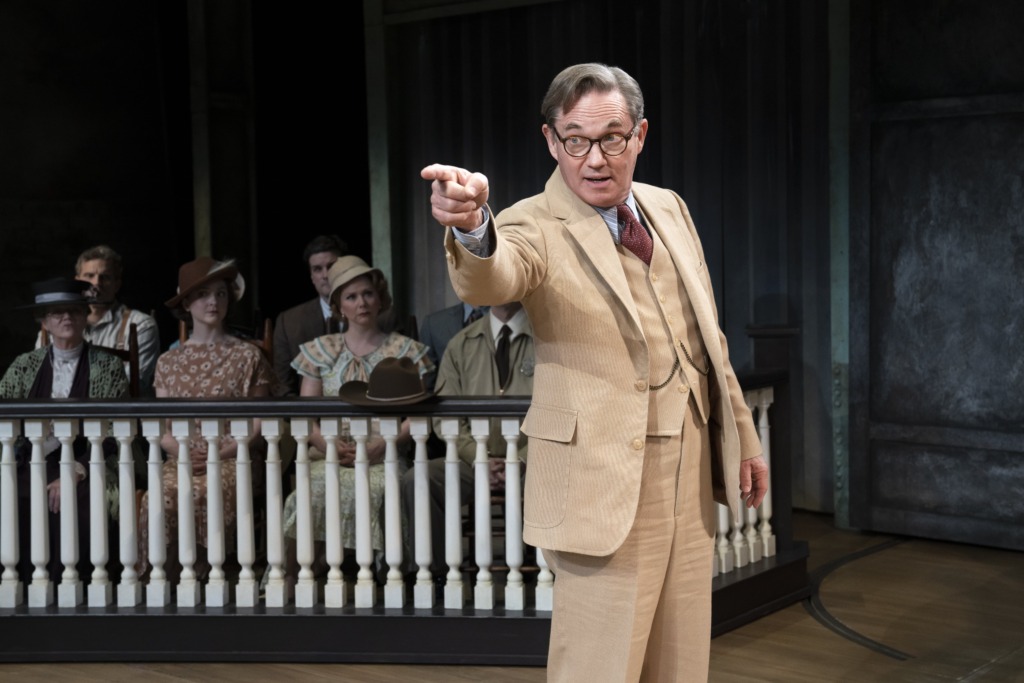
Five years and a pandemic later, the production (from which Rudin “withdrew” amidst further accusations making him the face of abusive Broadway working conditions and the impetus for demanding an end to them, then, in one final abusive power-play “reinstated” himself just long enough to close the show on Broadway last year before it could reopen) is now enjoying a deservedly successful national tour playing this week at the Hippodrome. And with all the internal and backstage drama in the rearview mirror, we can now finally focus on the redeeming qualities of the play itself and Sorkin’s adaptations to make it work on stage, and the view is magnificent. It’s themes of racism and white perceptions of its implications are sadly and obviously still relevant and universal. Director Bartlett Sher (as he has shown repeatedly in his Lincoln Center’s The King & I, South Pacific, and My Fair Lady) is unparalleled for drawing out subtle, believable, introspective, realistic characters from his performers, and he has an incredibly gifted cast from which to paint his intricate and intimate portraits.
The company is led by TV veteran Richard Thomas, who provides a strong center for Sher to build his updated morality tale around. And between the two they keep the three-hour piece moving so quickly and fluidly that the audience easily suspends time to invest in their tale without realizing where the time went. Thomas (who succeeds Broadway stars Tony Nominee Jeff Daniels, Ed Harris, and Greg Kinnear in the role) is a natural match. What could be cynically seen as clever stunt-casting is actually an inspired use of Thomas’ strengths as he draws effortlessly on his familiar persona as the wise, rural, depression-era moral compass that he brought into America’s living rooms for the better part of a decade fifty years ago. Underneath his perceived understanding of the world—the lessons about racism, parenting, and the basic goodness of people in general—there is still a hint of the idealistic John Boy Walton grown up and balancing his optimistic view of the world as it should be with the disillusionment of how it actually turned out. We never stop cheering for Thomas, even as he finally compromises his beliefs to gain what small victory he can.
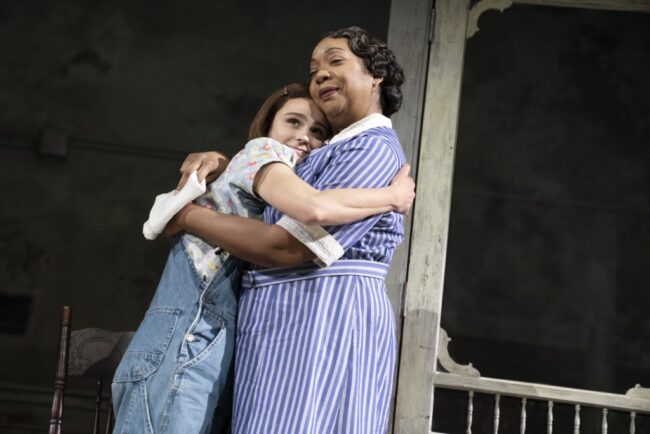
As daughter Scout, the character through whose eyes we still observe the story, Melanie Moore is a joy, jumping back and forth from innocent child who gets a hard lesson in the realities of real life at an early age to adult lawyer who narrates the show recalling the most important events of her life. Sorkin has always been considered a master of dialogue and expertly floats between his sweetly innocent views from the eyes of the children and the more worldly views of the adult versions who narrate the tale to us and the father who inspired them. It could even be said that he utilizes his infamous “walk and talk” method of storytelling as Scout comes forward between scenes to “converse” with the audience from the front of the stage.
Opening night in Baltimore was a testimony to the current awareness of understudy appreciation in the theatrical community, with replacement casts everywhere gaining much more attention in today’s post-Covid age. [An unheard of four of the last five national tours I’ve reviewed and every show I’ve seen on Broadway in 2023 have featured one or more outstanding understudy performances.] Understudies Daniel Neale and Morgan Bernhard (who performed the key roles of Scout’s brother Jem and best friend Dill respectively at this performance) seamlessly inserted themselves into the action as if they had performed with this cast eight shows a week. Neale’s Jem conveys all the big bother/young man wisdom to give him good intentions and a more realistic view of the world his younger cohorts inhabit balanced with the impetuous decisions consistent with the last days of his own waning childhood. Bernhard is charmingly goofy as the quirky, comic relief, a Dill who proudly moves to his own drummer and is totally comfortable with that fact.
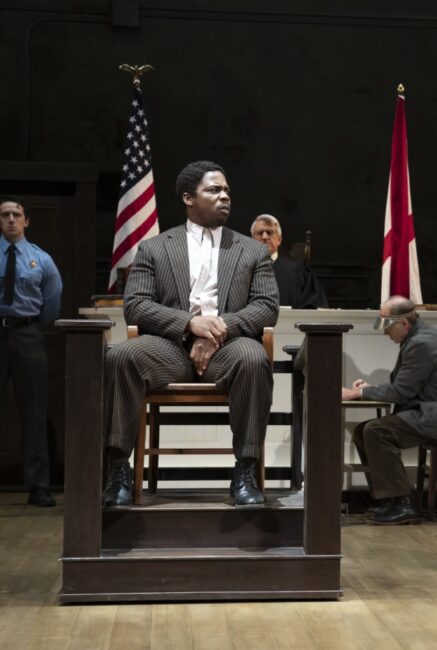
Yaegel T. Welch is heartbreaking in a moving performance as a clearly-framed Tom Robinson, fighting an uphill battle to be declared innocent of a crime which he is proven beyond a reasonable doubt incapable to have committed, but at the mercy of a racist all-white jury. Jacqueline Williams as Calpurnia is a strong, welcome presence as she provides the “passive-aggressive” grounding reality reminding Finch that even his far-left progressiveness is still rooted in inconvenient truths that either are drawn from or naively ignore the racism that even the more fortunate black folk like herself experience every day of their lives.
Among the uniformly strong ensemble that make up the rest of the residents of small-town Maycomb, Alabama, standouts include Joey Collins as the villain of the piece, the despicable, alcoholic, abusive, white trash Bob Ewell; Arianna Gayle Stucki as his not-so-obedient daughter, alleged rape victim Mayella; and David Manis as the dry, no-nonsense Judge Taylor who has no patience for the fancy legal posturing of pretentious prosecuting attorney Horace Gilmer (a deliciously smug Luke Smith). Travis Johns also makes a heartwarming (almost literal) 11:00 appearance as gentle, misunderstood would-be villain, the mysterious Boo Radley.
One performance of special note with sentimental value to this production was the appearance of Mary Badham in the cameo role of Mrs. Henry Dubose, the “crazy old lady at the end of the street” who is so mean and vicious to Scout in their limited stage-time together. For those who don’t recognize the name, check only so far as IMDb to find that Badham gained cinematic cred as an 8-year-old when she created the role of Scout Finch in the iconic Gregory Peck movie. What a sweet moment to come completely full circle in the twilight of her nearly seven-decade long career.
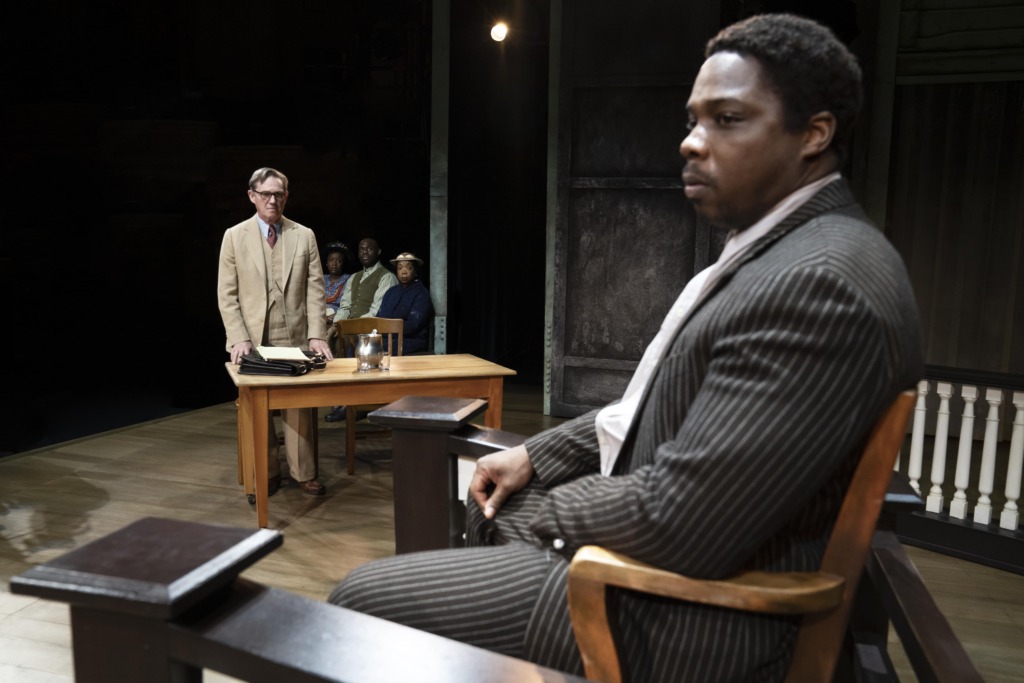
Scenic Designer Miriam Buether’s imposing unit set is very effective selecting the decaying structure of an ancient rural municipal building as the backdrop for the morality play, with extremely fluid set changes despite featuring substantial pieces that float in and out between the courtroom and the Finch home. Costume Designer Ann Roth flawlessly dresses her cast in her typically impeccable period wear in easy-on-the-eye soft pastels and earth tones. She excels with the rural play clothes she employs for the clearly 20-something actors who play Scout, Jem, and Dill. For between her designs and their enthusiasm in the roles, we never question their youth within the story. Lighting Designer Jennifer Tipton compliments them both with effective, enhancing mood lighting, and Scott Lehrer provided exceptionally clear sound.
Big musicals usually dominate the season at touring houses nationwide. But this grand, sweeping classic American story is a welcome, strong addition to the Hippodrome’s current season. It’s a resounding tale that still stings with its unavoidable sadness and discomfort when it confronts us with the racist roots it lays in front of us—a sad reminder of how far we’d like to think we’ve come in the last century versus how little we actually have. See the play, then read the book and watch the movie. We still have so much to learn.
Running Time: Approximately 3 hours and 15 minutes with one intermission
To Kill A Mockingbird plays through March 19th 2023 at The Hippodrome Theatre in The France-Merrick Performing Arts Center- 12 North Eutaw Street Baltimore, MD 21201. For tickets call (410) 837-7400 or purchase them online.

